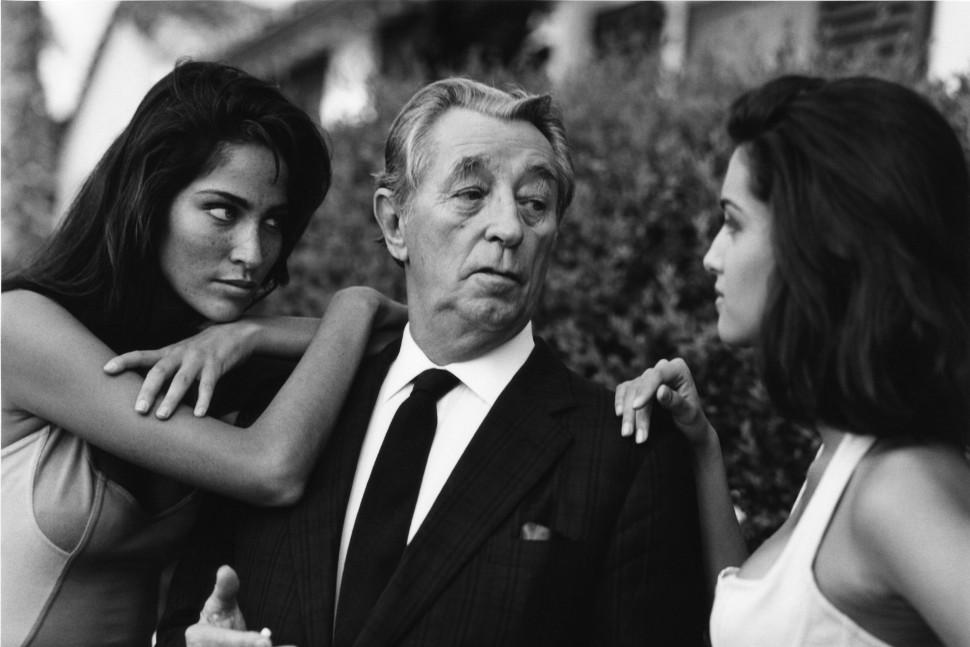
Dir: Bruce Weber | US Doc | 91′
Suave screen idol Robert Mitchum comes across as a crooning hearth-throb in Bruce Weber’s starry cinematic sashay that contains previously unseen interview footage shot during the 1990s.
Bruce Weber is best known for his black-and-white fashion shots (for Abercrombie & Fitch) but here turns his camera on the prolific career of a Hollywood antihero who made over 133 screen appearances during the 1940s, 1950s and 1960s – most notably in Cape Fear, Night of the Hunter and Out of the Past.
Nice Girls Don’t Stay for Breakfast follows the usual format of archive footage (taken in 1997) and interviews with people connected to Mitchum, particularly in his later years when his nonchalant presence could change the atmosphere in a room. Shot in Weber’s stylish monochrome camera the film opens with Johnny Depp recalling how Mitchum would always reply “Worse” when asked how he was – on the telephone. This was a response he’d picked up from Groucho Marx. Liam Neeson and Benicio Del Toro also share their memories of a much-celebrated but quietly complicated man who embodied American masculinity.
Named after the song by Mitchum’s The Wonderful Country co-star Julie London, the film explores how the macho star could also be tender and gentle despite his tough guy image, and reveals his musical talent with footage from the recording of a jazz album (that has never been released) that sees him enjoying an amusing time with Marianne Faithful as the duo record together at Capitol Records.
Mitchum certainly knew how to flirt, using some well-rehearsed one-liners and jokes. But Weber shows how he mellowed significantly in later years without losing any of his sardonic undercurrent of complexity. In a darker moment, his daughter recalls his talk of suicide, but this is an avenue that Weber never explores, along with his time behind bars for possession of marijuana. On the relationship front, we hear how he was devoted to his wife Dorothy – the two met in their teens and stayed together – despite dalliances, amongst them with Shirley MacLaine who never appears to give her side of the story.
Nice Girls is largely freewheeling and episodic rather than chronologically biographical in format: hardly anything is mentioned about Mitchum’s upbringing or the early years of his career in Hollywood. His late co-star Polly Bergen talks about her feelings during the unsettling brutal rape scene in Cape Fear when he smoothed raw egg on her décolleté, culminating in her falling in love with him. Afterwards she claimed he was the epitome of tenderness, apologising profusely after the manhandling episode where he appeared to be ‘in a trance’. Perhaps this is even a latent bid on the director’s part to explain the bad behaviour that led to the #metoo backlash, given that Weber was also fingered during the affair.
Clearly Robert Mitchum’s choice of roles makes him one of the more edgy and interesting stars in the Hollywood firmament but he clearly had many strings to his bow, and one was undoubtedly a talent for carrying a tune, evidenced in his renditions of Ned Washington’s ‘Wild is the Wind’ and Mitchell Parish’s ‘Stars Fell on Alabama’ which enrich this pleasurable film along with its woozy jazz score. Irving Berlin’s ‘Dancing Cheek to Cheek’ and Gershwin’s ‘Isn’t it a Pity’ complete the audio picture of this intriguing talent to amuse. MT
VENICE FILM FESTIVAL CLASSICS 2018